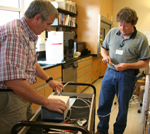New disaster, continuity plan aids research
community
by Cindy Abole
Public Relations
Reviewing a campus plan to guide scientists and research lab teams in preparation of a hurricane or other major disaster was among the top priorities for Associate Provost for Research Stephen M. Lanier, Ph.D., when he returned to MUSC almost two years ago. From 1991 and 2001, Lanier was a faculty member in the Department of Cell and Molecular Pharmacology and Experimental Therapeutics.
Lanier, who became MUSC’s chief executive research officer in December 2006, led this effort and collaborated with campus researchers and research support service departments to establish a new Research Continuity/Disaster Preparedness Plan for the research community to follow. All research support teams have created an emergency preparedness plan that is regularly reviewed and discussed by staff. The plan does not replace MUSC’s broader Severe Weather Plan established for university and hospital employees and students.
“Good communication is an essential component for preparing for, responding to and recovering from emergency disaster events such as those involving major storms,” said Lanier.
Lanier knows firsthand the challenges of the unexpected and poor planning in the wake of a major disaster after experiencing the destruction caused by Hurricane Katrina in August 2005. Lanier was chair of the Department of Pharmacology at Louisiana State University (LSU) Medical Center in New Orleans when Katrina hit. The storm’s impact crippled the education, service and research missions of LSU’s Health Sciences Center. Lanier led the temporary relocation of 100 department staff and helped coordinate the department’s limited operations at the Pennington Biomedical Research Center-LSU in Baton Rouge.
 Pharmacology’s
Cliff Harvey, left, and Mark Lovin make some adjustments to a Thermo
Forma Gas Guard device inside Dr. Jennifer Issacs’ Cell and Molecular
Pharmacology lab at Hollings Cancer Center. The men are part of
Pharmacology’s facilities support team that regularly inspects labs for
equipment problems, maintenance and lab preparation in the event of a
weather emergency or major disaster.
Pharmacology’s
Cliff Harvey, left, and Mark Lovin make some adjustments to a Thermo
Forma Gas Guard device inside Dr. Jennifer Issacs’ Cell and Molecular
Pharmacology lab at Hollings Cancer Center. The men are part of
Pharmacology’s facilities support team that regularly inspects labs for
equipment problems, maintenance and lab preparation in the event of a
weather emergency or major disaster. MUSC’s Office of the Associate Provost for Research (APR) has reviewed and approved various campus unit plans for preparedness in terms of research program continuity, especially for times of disasters and other catastrophic events. Areas including the offices of Research Facilities Administration, Research Sponsored Programs, Research Integrity, Research Development, Foundation for Research Development, Engineering and Facilities and Libraries and Learning Resource Center; and the Department of Laboratory Animal Services are prepared to handle severe weather and communicate directly with the animal user group. The plans follow similar research and recovery action guidelines and disaster management policies developed for the University of California-Berkeley.
Because disaster events may come without warning (i.e. fire, explosion or earthquake), there may be damage to buildings and short/long-term loss of power within facilities. The new guidelines will help laboratory personnel prepare their work areas for mandatory evacuation and provide emergency power information for each of the campus’ research buildings.
Among the first components for advanced preparation is establishing a communication plan. Each principal investigator must create an updated contact list of all laboratory personnel (including contacts via mobile, home, office phone numbers, addresses and e-mail).
Each lab member must have established a personal disaster preparedness plan (evacuation of family and pets). No one except essential personnel will be allowed to remain on campus in the event of a mandatory campus evacuation order. Lab teams must prepare a priority list of specially handled items in the event personnel unfamiliar with lab equipment must access the area for recovery operations. Staff also should update vendor phone numbers and back up all research data to external hard drives. Labs should maintain an updated inventory list of perishable lab items and update a lab map showing the location of rooms, freezers, refrigerators, etc. Staff should be familiar with emergency outlets (red plugs) throughout the laboratory, shutdown procedures for sensitive equipment, and prepare heavy duty extension cords for freezers and refrigerators.
Lanier will be able to monitor and communicate the status of research labs and buildings immediately following a major storm or event via online message updates or alerts at http://research.musc.edu or at APR link http://www.musc.edu/weatheremergency.
“Often, we take too much for granted of what people know and don’t know regarding planning and preparation for these types of situations,” said Lanier. “We have a responsibility to readiness throughout the lab, department and organization and must rely on effective communications and other tools to continue to enhance our plans.”
To view MUSC’s Research Continuity/Disaster Preparedness Guidelines, visit its Web site at http://research.musc.edu/DPRC.html.
Friday, Oct. 3, 2008
Catalyst Online is published weekly,
updated
as needed and improved from time to time by the MUSC Office of Public
Relations
for the faculty, employees and students of the Medical University of
South
Carolina. Catalyst Online editor, Kim Draughn, can be reached at
792-4107
or by email, catalyst@musc.edu. Editorial copy can be submitted to
Catalyst
Online and to The Catalyst in print by fax, 792-6723, or by email to
catalyst@musc.edu. To place an ad in The Catalyst hardcopy, call Island
Publications at 849-1778, ext. 201.